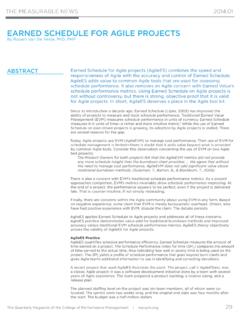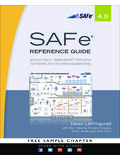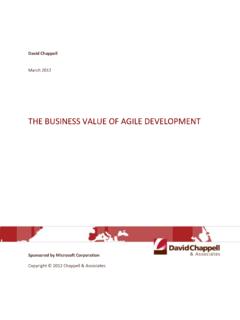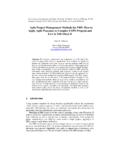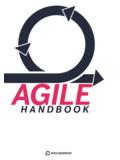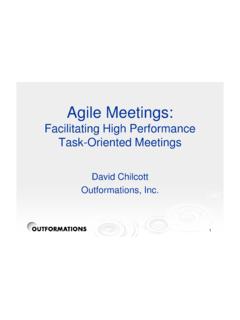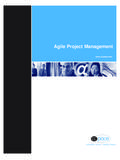Transcription of Towards a Framework of Agile Coaching …
1 8262 Kincross Drive Boulder, CO 80301 Summer 2011 2011 Agile Coaching Institute Developing Great Agile Coaches Towards a Framework of Agile Coaching Competency Part I Published in alignment with the IC Agile Coaching & Facilitation Track By: Michael K. Spayd, Co-President Lyssa Adkins, Co-President Purpose Getting good results with Agile is relatively easy: form a cross-functional team, prioritize backlog items, create shippable product each iteration. Basically, follow the process and your team is likely to deliver value. No surprise here. Getting truly great results, especially consistently, is a bit more rare.
2 Great results require a great team. And great teams rarely just happen. A team aspiring Towards greatness often needs a coach: trained, experienced, competent in her craft. Ah, there s the rub! How do we create good (even great) Agile Coaches? We maintain that, as an industry we do not know how. Beyond basic Agile training, there is no clear path a coach can take Towards competence, let alone mastery. For instance, how do Agile coaches know what to study, with whom, and for how long? Just as bad, who (or what) will recognize them when they achieve competence?
3 Consistently creating competent Agile coaches requires guidelines for what coaches do, criteria related to what they must know, and one or more methods or pathways to help them get there. In former times, the guild structure developed craftsmen, who became skilled practitioners. In the modern world, the concept of a profession has replaced the guilds. Agile Coaching has neither. It is conducted in an ad hoc, even erratic manner. It is not a profession. We believe, however, that Agile Coaching is an emerging profession.
4 And we hope to be agents in and accelerators of that evolution. Our intention is to begin giving form to the discipline of Agile Coaching . In this paper, we focus on the core element needed for Agile Coaching to become a profession: we propose the beginnings of a competency model, namely a Framework for a competency model. We believe that now is the time for such a Framework : to begin using it, to learn from its use, and to evolve the Framework through new situations, uses and needs. We welcome your feedback at A Competency Framework A competency model is a key prerequisite for a serious profession.
5 Here we want to distinguish a competency model from the competency Framework outlined in this paper. To make clear the contrast, let s look at an example competency model from the International Coach Federation (ICF): ( ). Here is an excerpt from the ICF competency model revealing its very specific level of detail: C. Communicating Effectively 6. Powerful Questioning - Ability to ask questions that reveal the information needed for maximum benefit to the Coaching relationship and the client 1. Asks questions that reflect active listening and an understanding of the client's perspective, 2011 Agile Coaching Institute 2.
6 Asks questions that evoke discovery, insight, commitment or action ( , those that challenge the client's assumptions), 3. Asks open-ended questions that create greater clarity, possibility or new learning 4. Asks questions that move the client Towards what they desire, not questions that ask for the client to justify or look backwards. This level of behavioral detail supports a fair process (such as certification) that allows experts to judge whether others have met the standards in the model. For Agile Coaching , this level of detail may well be useful at some point, but it is not the first move to make.
7 Instead, we are proposing a Framework for the competencies an Agile Coach needs, rather than specific behavioral statements that may be required for different applications. We hope to activate the Agile community into reflection, introspection and discussion of this Framework , not debate or argument about the details that could become necessary at some later point. Our Framework consists of eight primary areas of competence that provide a focus for education and professional development for the aspiring Agile Coach.
8 The competency areas are clear statements of direction, rather than detailed enough to allow practitioners to judge whether they (or others) have acquired the relevant competency. An Overview of the Competencies A brief description of the eight Agile Coaching competencies follows, divided into four clusters, plus a central integrating stance. Process-focused competencies: Coaching & Facilitating Coaching and facilitating are related areas of expertise. In both, the practitioner is responsible for holding the process on behalf of the client1, rather than acting as an 1 Our use of the term client is not meant to apply only to external Agile Coaches, but to employee Agile Coaches as well.
9 This is similar to how the expert in the content. For instance, the Coach holds the mirror of accountability for the individual, team, group or organization they coach. Similarly, the Facilitator conducts the process of the meeting or event without getting involved in the content. Specifically, acting as a Coach means allowing the client s priorities and values to determine the direction, rather than the coach s expertise or opinion. In the same vein, the ability to act as Facilitator for a team or group process requires hewing to their purpose and definition of success, rather than to one s own.
10 Of note, both Coaching and Facilitating are professions in their own right, with competency models, professional standards, and ethics. Content-focused competencies: Teaching & Mentoring In Teaching and Mentoring in contrast to Coaching and Facilitating the practitioner specifically relies on her content expertise, seeking to impart some of it to the client. Teaching is the ability to offer the right knowledge, at the right time, taught in the right way, so that individuals, teams and organizations absorb and use the knowledge for their best benefit.
